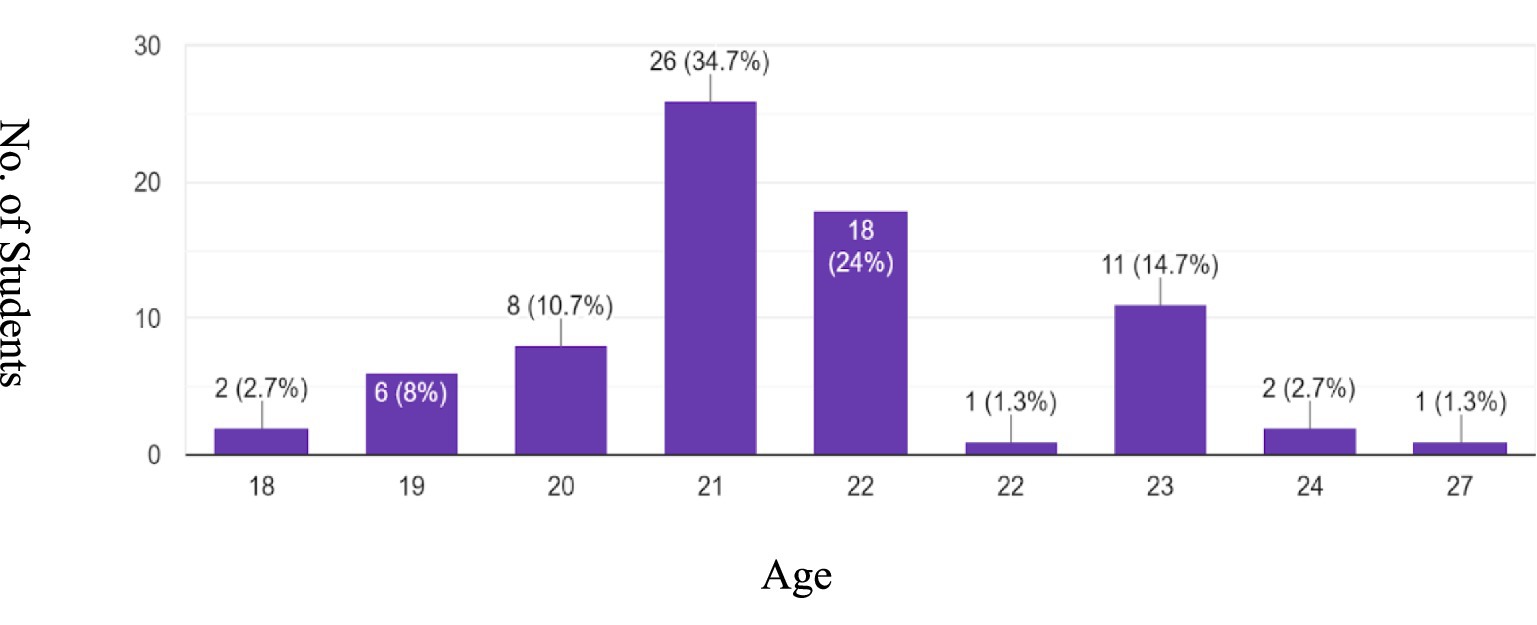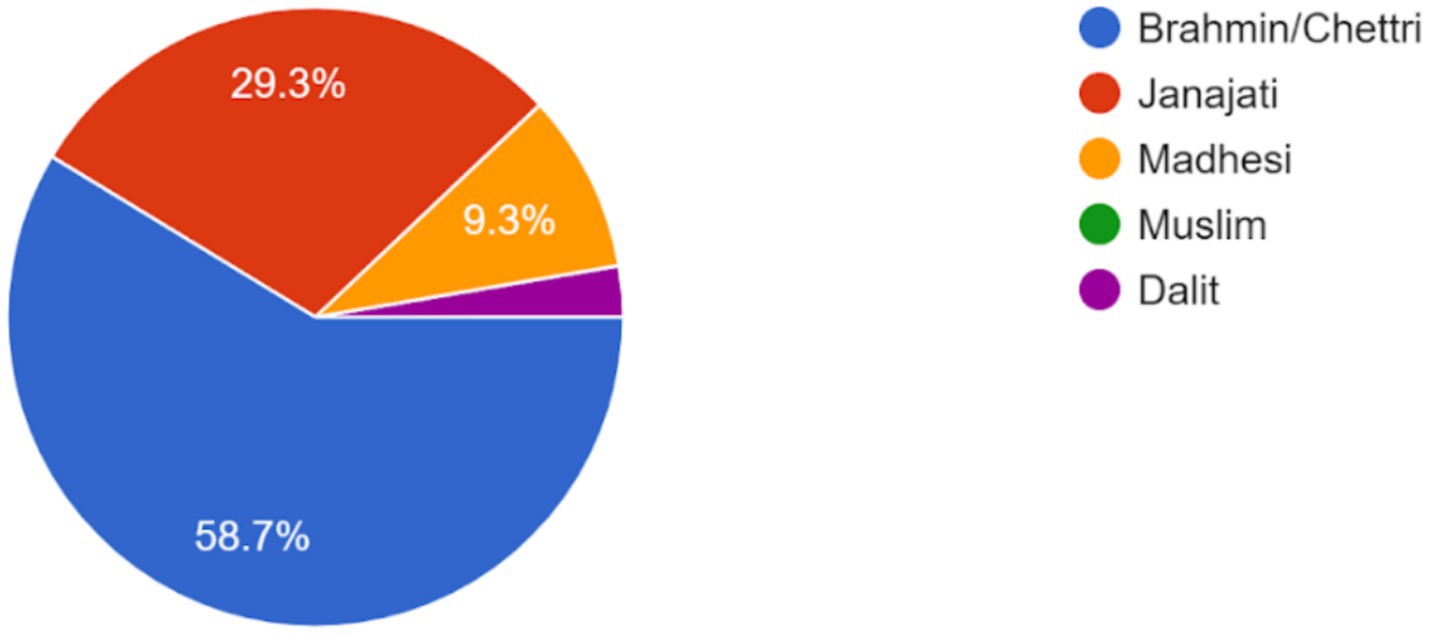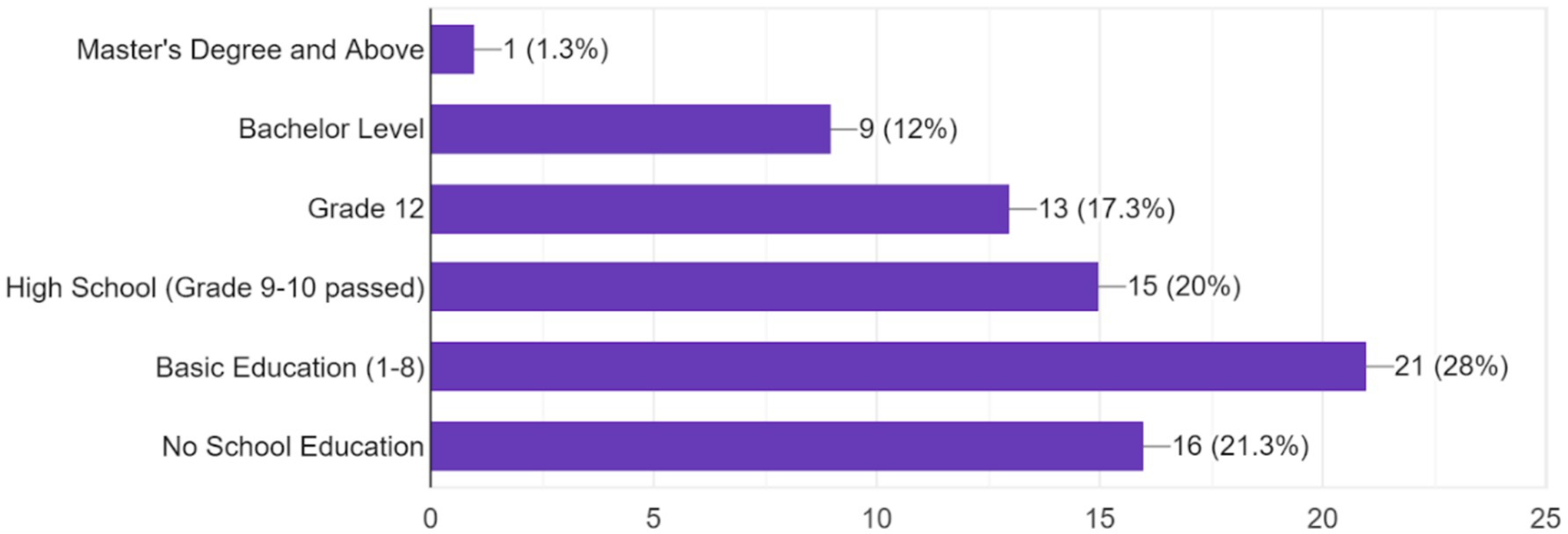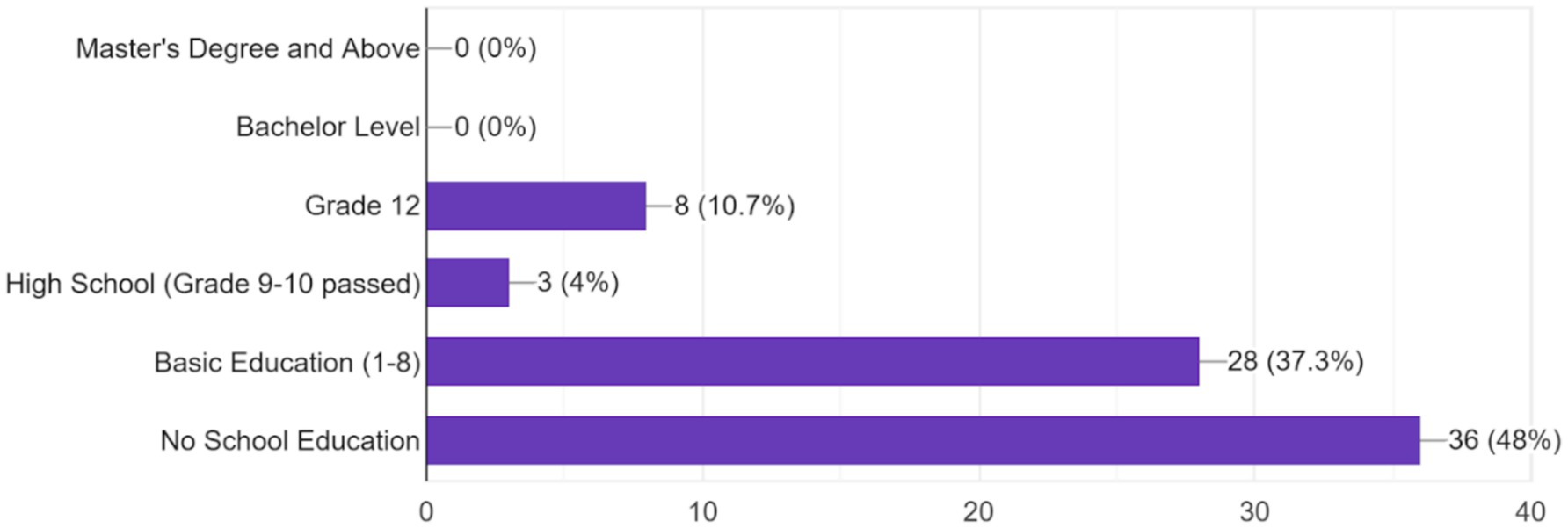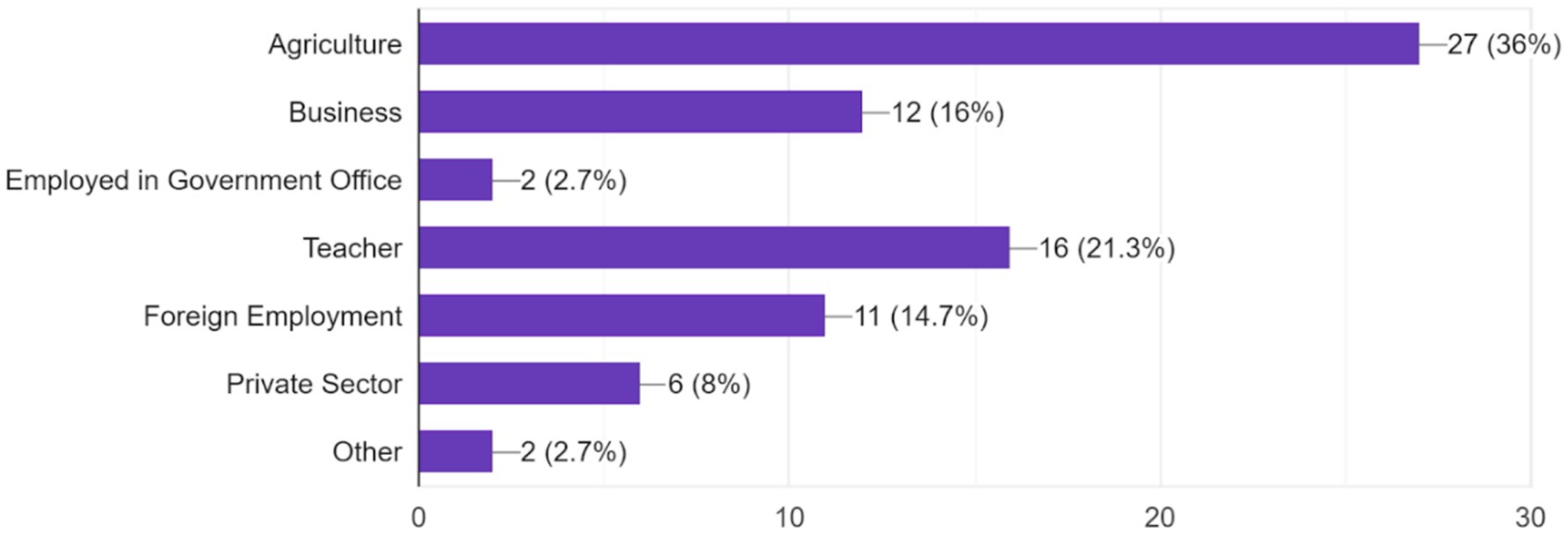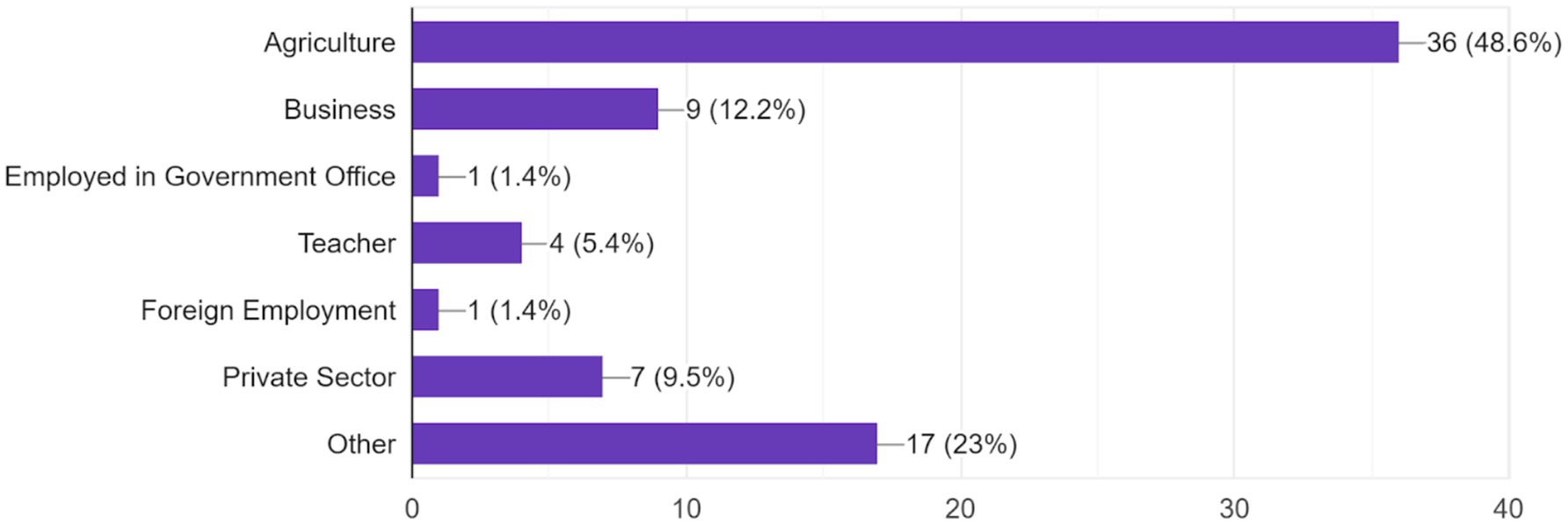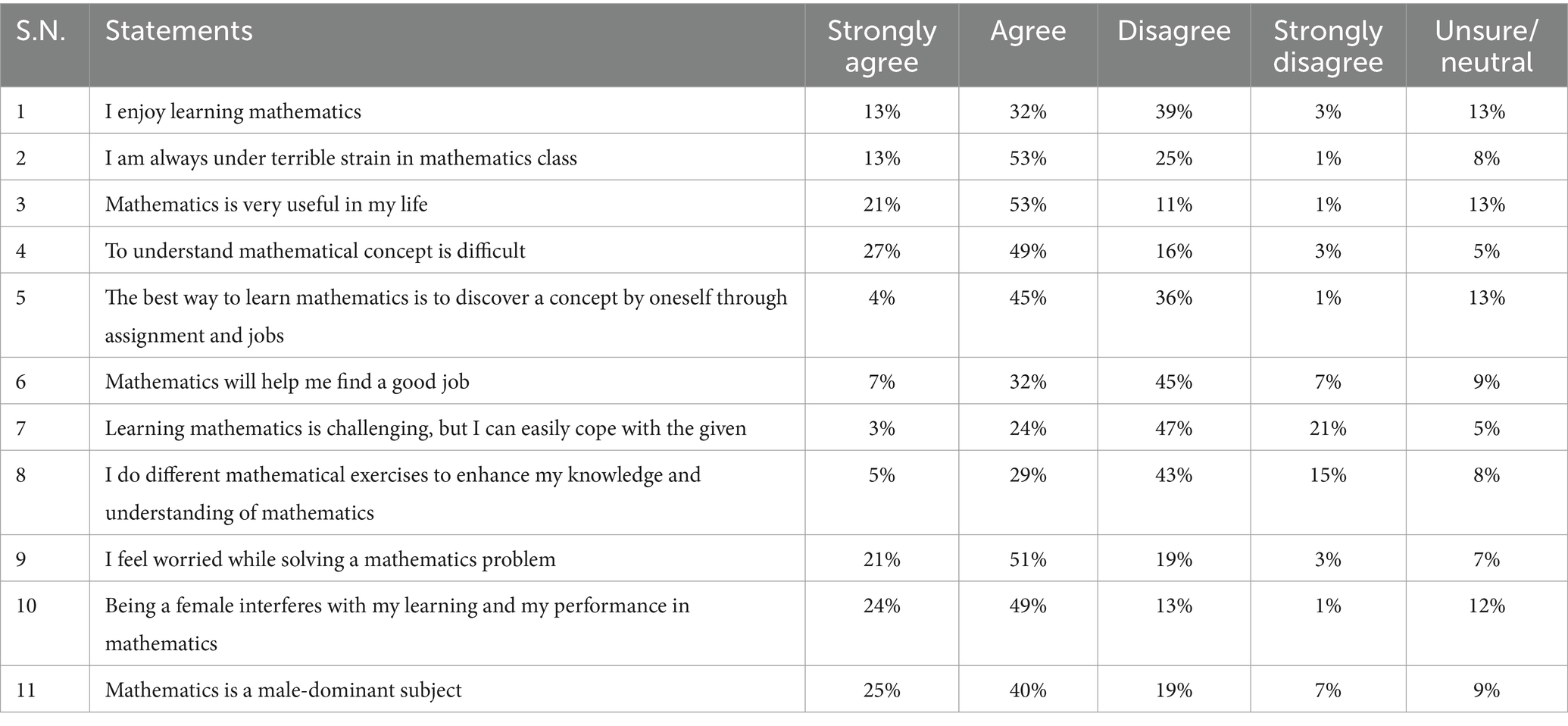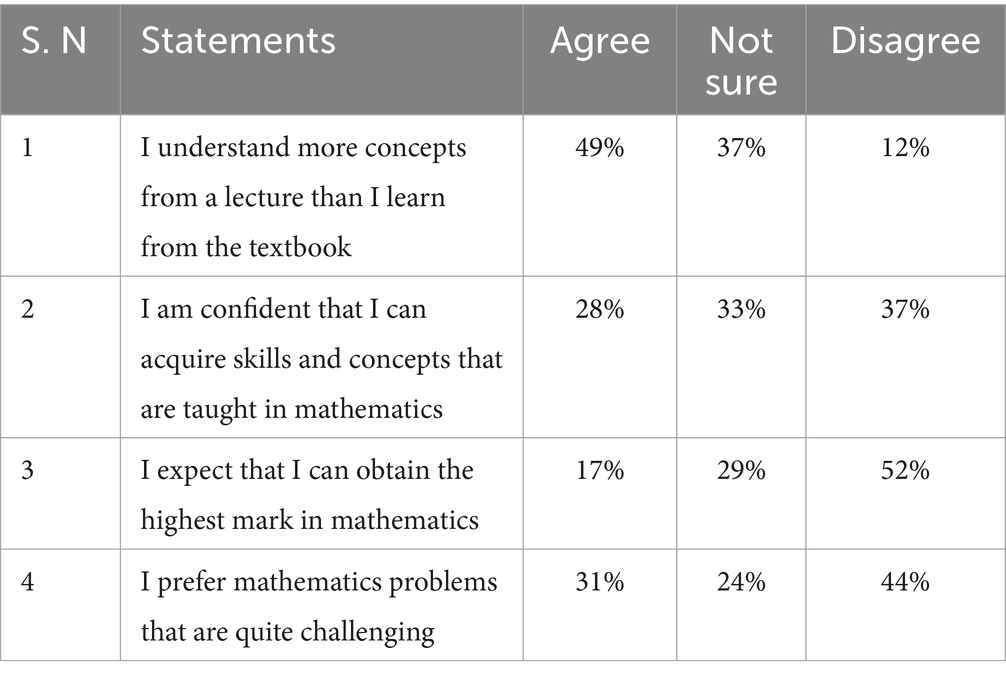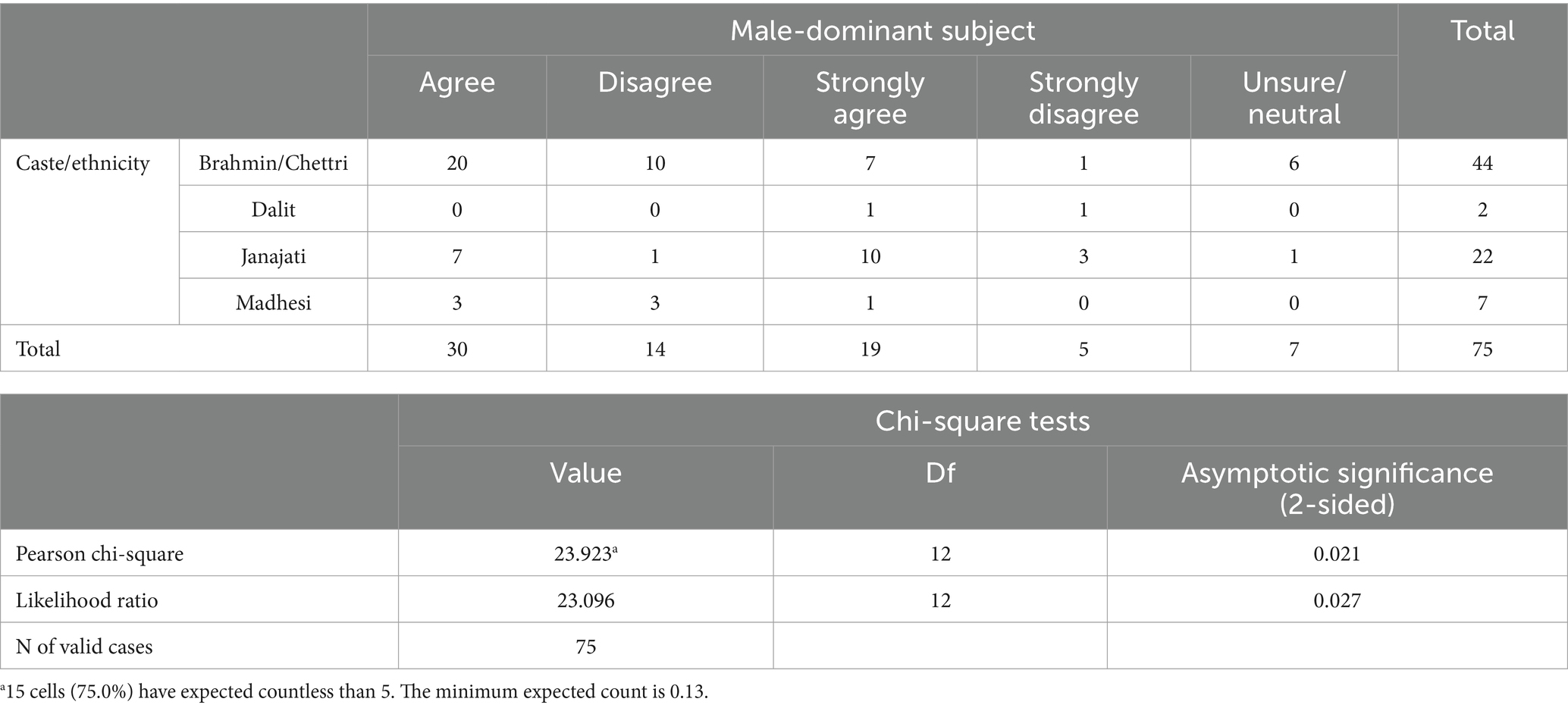- 1Tribhuvan University, Mahendra Ratna Campus, Tahachal, Kathmandu, Nepal
- 2Kathmandu University School of Education, Lalitpur, Nepal
- 3Department of English, United International University, Dhaka, Bangladesh
Mathematics is essential in daily life and career development, yet gender disparities persist, particularly in contexts such as Nepal, where socio-cultural norms influence educational access. This study examines the perceptions of female undergraduate mathematics students at Tribhuvan University, Nepal, exploring factors affecting their attitudes, self-efficacy, and motivation. A mixed-methods QUAN-QUAL research design integrated quantitative surveys (n = 75) and qualitative interviews (n = 4). Quantitative findings revealed that 72% of participants held negative attitudes toward mathematics, perceiving it as stressful (66%) and male-dominated (65%), with low self-efficacy (37% negative) and ambivalent motivation (49% uncertain). Caste/ethnicity significantly influenced perceptions of mathematics as male-dominated (χ2 = 23.923, p = 0.021). Qualitative insights highlighted socio-cultural barriers, including familial pressures prioritizing marriage over education, gendered stereotypes, and limited parental education. Female undergraduate students reported balancing household duties with academic demands, exacerbating stress and self-doubt. Despite recognizing mathematics use, systemic inequities hindered engagement. The study underlines the need for gender-sensitive curricula, confidence-building pedagogies, and community awareness to challenge stereotypes and enhance support. Recommendations include policy reforms, scholarships for marginalized groups, and teacher training to foster inclusive learning environments. Addressing these barriers is critical to transforming mathematics education into an equitable and empowering space for Nepali female students.
1 Introduction
Mathematics is indispensable to the daily lives of individuals everywhere in the world, given that many calculations are required for these activities. Additionally, mathematics is commonly recognized as a fundamental subject required for employment in various fields. Mathematics develops students’ reasoning abilities independently, logically, and creatively, molding their minds. Therefore, it is imperative that every student is provided with the necessary resources and opportunities to acquire a comprehensive understanding of mathematics (Kane and Mertz, 2012). Regarding any given subject, opinions differ among individuals. As articulated by Luthans and Youssef-Morgan (2017), perception is a complex cognitive process that constructs an individualized representation of the world, which may significantly diverge from objective reality. This concept is particularly pertinent in the context of mathematics. Each student’s perception of mathematics is shaped by their unique experiences and educational background, resulting in diverse responses and behaviors toward mathematical concepts. Given that each student possesses a distinct cognitive filter, identical mathematical problems and stimuli can evoke a wide array of interpretations and reactions. Perception involves the comprehension and representation of information through interpretation, and in the field of mathematics, it also encompasses the process of acquiring an understanding or awareness of mathematical data and concepts (Qiong, 2017).
Perceptions of mathematics are defined as mental representations or perspectives of the subject that are presumably formed through social interactions, school interactions, or the influence of parents, teachers, and peers (Foley, 2016). It can be described in a general sense as an individual’s perspective on the surrounding environment. Given its focus on awareness, perception is inextricably linked to both attitude and performance. Behavior in a given circumstance is determined by an individual’s attitudes. Attitude is defined by Mazana et al. (2019) as an individual’s propensity to react favorably or unfavorably to a particular entity, circumstance, notion, or individual. Envision an individual endowed with the ability to interpret all information in a favorable manner. If this occurs, they will possess a constructive mindset and be capable of excelling in the circumstances associated with that knowledge. A negative perception corresponds to a negative attitude and a subsequent deterioration in performance. Furthermore, in the context of mathematics instruction, students’ perceptual abilities differ significantly, which can have an impact on their academic performance. Additionally, it encompasses mental representations of things originating in prior experience and beliefs, attitudes, and perceptions linked to mathematics. Over the past two decades, there has been a notable increase in the enrollment of female students in various academic disciplines, including science, technology, engineering, and mathematics, within the context of universities in Nepal. As of the conclusion of 2011, the total number of campuses stood at 1,087, comprising 302 community campuses, 83 constituent campuses, and 702 private campuses (UGC, 2012). Nepal witnessed a substantial surge in the enrollment of students in higher education, which escalated from 38,000 in 1980 to 408,000 in 2010. In 2012, 87% of the 407,934 students enrolled in higher education were enrolled at Tribhuvan University (UGC, 2012). From 1980 to 2010/11, the percentage of female students enrolled in higher education increased dramatically from 19 to 42% (UGC, 2012).
As of the present, Tribhuvan University has a total of 62 constituent campuses and 1,127 affiliated campuses dispersed throughout Nepal. A total of 303 campuses are affiliated with Tribhuvan University in Kathmandu Valley, of which 23 are constituent campuses. Mathematical majors comprise 44.90% of the total number of undergraduate students in the Kathmandu Valley’s education and humanities departments. Among them, 223 students are enrolled in the humanities and 226 students are enrolled in the education program. In contrast to the 193 male students enrolled in the humanities and 140 female students in education, the Office of the Controller of Examinations at Tribhuvan University reports that there are only 29 female students in humanities and 86 in education. The underrepresentation of female students in mathematics persists, according to the data, as a result of a number of detrimental factors affecting information access, field selection, retention, and graduation. Cultural norms, preferences, motives, values, and stereotypes may explain this circumstance. However, there is a lack of data regarding the correlation between the achievement of female students and their perception of mathematics study. The present study aims to investigate the various factors that influence the perceptions of mathematics among female undergraduate students at specific campuses of Tribhuvan University of Nepal. In this context, this study aims to examine the perceptions of female undergraduate mathematics students regarding the subject.
2 Problem statement
In the context of Nepal, distinct social norms, values, and cultural barriers are believed to influence the perception of male and female students. In general, female mathematics instructors and students are not regarded favorably by society. This raises the question of how female students can possibly study and teach such a complex subject. Thapa (2012) noted that female students are occupied with cooking food in the kitchen, performing housework, and laboring in the fields. The prevailing misconception is that challenging academic disciplines, such as mathematics, are inappropriate for female students to pursue. Lack of confidence and low self-esteem characterize female students. They consistently prefer to keep a respectful distance from male students. An examination of gender disparities in mathematics self-confidence was conducted by Norton and Rennie (1998), who concluded that female students generally exhibited lower levels of confidence in the subject compared to male students. This misconception is deeply embedded in the mindset of female students (Hansen, 2012). Their internal mindset influences mathematical comprehension and application. Mathematics is a subject that distinguishes students, irrespective of their socioeconomic status or gender, according to findings from numerous researchers around the globe. Certain mathematical studies have shed light on a longstanding gender disparity that has historically favored male students. The perception of mathematics as a challenging subject is widespread among female students (Paudel, 2018). Poor performance in mathematics examinations and discouragement from peers, parents, and even some instructors are a few factors contributing to the difficulty of the situation. Moreover, instructional activities are directed by mathematical theoretical models, which have resulted in the subject matter appearing abstract and challenging to the students. This body of practical knowledge is generally considered to be well-established. Considerable attention is drawn to the manner and extent to which female students’ perceptions regarding mathematics impact their mathematical learning. Mathematical achievement is impacted by the positive and negative attitudes that female students possess. Prior knowledge, experiences, and the learners’ expectations, interests, and beliefs influence the learning process. Girls’ diminished academic attention from parents, educators, and society as a whole contributes to this shift in perception. Lower achievement results from the development of a negative attitude toward mathematics. Boys exhibit superior academic performance in mathematics across all mathematical content areas, caste/ethnicity, and ecological zones, as indicated by the National Assessment of Student Achievement (NASA) report (ERO, 2015, 2018). The potential correlation between mathematical perception and achievement generates considerable interest and requires further investigation. On the contrary, the precise circumstances surrounding the perception of Nepali female students in mathematics remain unknown due to a lack of comprehensive data on the subject. This research endeavor aims to determine the factors that influence the mathematical perception of female students and the subsequent impact on their academic performance. As a result, it is important to examine the perceptions and accomplishments of female undergraduate students in Nepal concerning mathematics-related subjects.
The objectives of this research study were:
• To explore the female students’ perceptions of mathematics at the undergraduate level.
• To examine the factors influencing how female students perceive mathematics at the undergraduate level.
The research questions for this study were:
• What are the perceptions of female students regarding mathematics at the undergraduate level?
• What are the factors affecting perception in relation to attitudes, self-efficacy, and motivation of female students toward mathematics at the undergraduate level?
3 Literature review and research gap
Various articles have extensively explored the current state of knowledge regarding mathematics perception, attitude, and performance (Giannoulas and Stampoltzis, 2021; Raquel, 2024). Research has highlighted significant disparities in how female students perceive mathematics, with many developing an understanding of the subject during their elementary years. However, the transition from secondary school to university often sees a higher attrition rate among female mathematics students than their male counterparts (Khanal, 2018). Studies from different regions, including South Africa, Zimbabwe, Rwanda, Kenya, and Nepal, have identified factors such as family background, self-confidence, societal perceptions, and educational support influencing female students’ attitudes toward mathematics. Despite the wealth of research, there remains a gap in studies specifically targeting undergraduate female students in Nepal, underling the need for further investigation into how their perceptions at this critical educational stage affect their attitudes and engagement with mathematics.
Regarding the current state of knowledge regarding mathematics perception, attitude, and performance, we have incorporated a variety of articles and studies conducted by a number of academicians. Many studies have explored how mathematics is perceived, highlighting differences in how female students view the subject. Female students develop an intimate understanding of mathematics during their elementary school years, according to Xie and Shauman (2003). The significant juncture during which students make significant career determinations is secondary education. It has been determined that the greatest proportion of female students abandon the mathematics sequence during the transition from secondary school to university, with the rates of female attrition significantly surpassing those of male students. Similar to male students, female students appear to be less inclined to pursue a career in mathematics. At a higher level, female students’ perceptions of mathematics are complex and abstract due to their lack of confidence in their ability to apply mathematics to their own activities. Concerning the context of South Africa, Mutodi and Ngirande (2014) investigated “The Influence of Students Perception on Mathematical Performance” and identified perception constructs that affect students’ academic achievement. Family background and support, mathematical interests and challenges, self-confidence, misconceptions and beliefs, mathematical deficiencies and strengths, teacher support and learning materials, and mathematical difficulties or challenges. According to Pajares (2005), gender disparities in self-efficacy beliefs regarding mathematics begin in middle school and accumulate throughout high school and college. Specifically, girls report lower confidence levels in their scientific and mathematical capabilities than boys. The study “Participation of rural Zimbabwean female students in mathematics: The influence of perception” by Gudyanga et al. (2016) demonstrates that rural female students regarded mathematics as a challenging and traditionally male-dominated subject that lacks relevance to their future ambitions. The perceptions of the participants were explained to be based on the prevalent cultural belief that mathematics is a subject dominated by men, which perpetuates negative stereotypes regarding the mathematical abilities of female students. Perception of the subject substantially impacted the level of female students’ engagement in mathematics. As a consequence of the generally negative perception of the subject fostered by the research findings, there has been a significant decline in the number of female students devoting themselves to mathematics. The objective of the study “Gender attitudes and perceptions toward mathematics performance and enrolment in Rwandan secondary schools” by Uwineza et al. (2018) was to examine the variations in gender-specific perspectives and attitudes regarding mathematics education. Data samples were gathered from 150 participants, including 60 female students, 84 male students, and six male mathematics instructors, via questionnaires, interviews, and classroom observations. According to the results of this research, boys and girls hold comparable views regarding the significance of mathematics courses. On the other hand, boys held unfavorable views regarding females’ mathematical prowess. Due to their lack of conviction in mathematics, females also held negative perceptions. The role of the educator discernibly influences gender disparities in mathematics learning. “Factors Affecting Girls’ Perceptions and Attitudes Towards Mathematics in Secondary Schools of West lands District, Nairobi Country, Kenya” is the title of a dissertation by Wambui (2018). According to the research, the mathematics curriculum has an adverse effect on the attitudes and perceptions of female students toward mathematics. Both students and instructors deemed the content comprehensive. Additionally, the students’ attitudes are influenced by the current pedagogical approaches and the dispositions of mathematics instructors. Regarding the exercises and assignments assigned by instructors, students and instructors felt that the time allotted for reviewing and covering the extensive material was insufficient. Male students’ perceptions and attitudes were adversely affected by gender stereotypes and the misconception that females were incapable of performing well in mathematics, according to the study. Students’ perceptual ability regarding the subject was similarly influenced by their home environment, parental encouragement, study time, peer attitudes, study materials, and material provision. Pangeni (2014) demonstrates in “Factors influencing the quality of education: A case study of eighth-grade students’ mathematics learning achievement in Nepal” that the impact of achievement is contingent on various student characteristics, including but not limited to preschool experience, gender, ethnicity, absenteeism, homework completion, and the perception of their mathematics teacher. Upon applying the second model to these attributes, the author discovered a noteworthy correlation with mathematical proficiency. Gender considerably influences mathematical achievement, according to the results of this investigation. Regarding students’ mathematics learning achievement, the variable of time spent studying at home did not, however, correlate significantly. Considering various influencing factors, the investigation concluded that boys performed better than girls. Some of these elements include parents’ educational attainment, parental support, literature, and the study environment at home.
Similarly, Bajracharya (2007), in her study “determinants of achievement status of grade eight students in mathematics,” assessed the scenario of the mathematics achievement level of grade VIII students in the Kathmandu Valley and identified the determinants that have a greater impact on the achievement of grade VIII students in mathematics. The status of achievement was examined through different parameters such as gender, location, and type of schools’ tests results showed the existence of gender differences in lower secondary school mathematics, as the researcher observed the situation where female students secured lower scores than boys. Furthermore, research shows that urban schoolgirl students scored higher than rural schoolgirl students. This achievement ratio shows the feeble perception of female students toward mathematics.
We reviewed a handful of literature from different authors regarding female students’ perceptions, attitudes, and achievements in mathematics. The studies reveal how female students, their family environment, mathematics curriculum, societal perception, and study duration affect the perception of female mathematics students. The research has been conducted at different levels of mathematics students, such as at school and university levels in different countries. However, we found no studies specifically targeting undergraduate female students, as the undergraduate level holds significance as a guide to the career path for every female who can choose to become a female mathematics professional. Furthermore, there is limited research on female mathematics students’ perception of mathematics in Nepal. Therefore, there is a need for a new study to investigate the possibility that female students’ perception of the undergraduate level of mathematics has an effect on students’ attitudes to mathematics.
While global and regional studies have significantly advanced our understanding of gender disparities in mathematics perception, attitude, and performance, critical gaps persist in contextualizing these findings (Leyva, 2017) to undergraduate female students in Nepal. Existing research across Africa, Asia, and Nepal has identified systemic barriers—such as cultural stereotypes, familial expectations, and pedagogical shortcomings—that shape female students’ engagement with mathematics. However, these studies overwhelmingly focus on primary or secondary education, neglecting the pivotal transition to higher education, where career trajectories solidify and societal pressures intensify. In Nepal, despite rising female enrollment in universities, mathematics remains stigmatized as a “male” discipline, with cultural norms (e.g., gendered domestic roles and marriage pressures) and institutional biases (e.g., lack of mentorship, male-dominated curricula) disproportionately discouraging female students from pursuing advanced studies. Prior work in Nepal (e.g., Bajracharya, 2007; Pangeni, 2014) has focused on school-level achievement gaps, leaving a glaring void in understanding how undergraduate female students navigate mathematics as a career pathway amid intersecting socio-cultural, familial, and institutional challenges. While studies in Rwanda, Zimbabwe, and Kenya highlight teacher attitudes and curriculum design as barriers, Nepal’s unique caste hierarchies, rural–urban educational divides, and post-conflict gender dynamics remain underexplored in shaping undergraduate perceptions. Furthermore, feminist critiques (e.g., Anderson, 2005) and social cognitive frameworks (Bandura, 1977) suggest that interventions must address localized belief systems (e.g., the perception of mathematics as incompatible with femininity) and structural inequities (e.g., parental education disparities and resource access). Yet, no study has applied these lenses to Nepal’s undergraduate context, where female attrition from mathematics peaks as societal expectations clash with academic aspirations. This gap is not merely academic but profoundly practical. Without targeted research into undergraduate females’ perceptions, policymakers lack evidence to design gender-responsive curricula, mentorship programs, or retention strategies. Similarly, the absence of intersectional analyses (e.g., caste–gender interplay) using mixed-methods research design obscures how marginalized groups experience compounded barriers. By centering Nepal’s undergraduate females—a cohort at the crossroads of tradition and modernity—this research addresses a critical void, offering insights to dismantle systemic inequities and reimagine mathematics education as a space of empowerment rather than exclusion. The urgency of this inquiry lies in its potential to transform narratives, policies, and practices, ensuring that unchallenged perceptions at this decisive educational juncture do not undermine Nepal’s strides toward gender equity in STEM.
4 Theoretical frameworks
The main theme of a feminist standpoint in mathematics education is that feminist research about girls and female students seeks to help them understand and transform themselves toward mathematics education rather than identifying the differences between female and male students (Anderson, 2005). Feminists stress changes that should occur in equal opportunities with appropriate educational policies. Feminism believes that female and male students have the same rational facilities and should not be detached in terms of sex and opportunity. So, the important part is to provide an equitable environment where both men and women can enjoy opportunities. After gaining opportunities, they become aware of the importance of mathematics through their senses. The societal conception of women is that they are intellectually, physically, and biologically incapable compared to men, which influences their perception capability (Bajracharya, 2007). The common misconception that women are logically and physically incapable in comparison to boys has a direct influence on their participation in the educational field. Feminism theory will guide the understanding of the perception of female students in mathematics.
Another theory guiding our research is Bandura’s Social Cognitive Theory (SCT) (Bandura, 1977). The main theme of Social Cognitive Theory is the learning basis of an individual. It states that an individual’s learning is not just limited to individual experiences but is also spread toward learning from observing the actions of others. SCT comprises several fundamental constructs, including self-efficacy, motivation, reinforcement, self-control, and observational learning. As a component of SCT, Bandura’s (1977) Model of Reciprocal Determinism describes how an individual’s behavior influences and is influenced by both personal and social factors. The Model of Reciprocal Determinism illustrates the interplay and influence of environmental and personal factors, such as educational programs and female proficiency in mathematics, on behavior. SCT is useful in our research to study factors affecting the perception of female mathematics students. We link this theory to the personal, environmental, and social factors from which we can get a clear picture of their influence on women and their effect on their perception, motivation, and achievement. So, these two theories guided the investigation of the perception of female mathematics students at the undergraduate level.
5 Research methods
5.1 Study design
The research uses a mixed method—QUAN and QUAL—research design. Mixed-method research involves the integration, evaluation, and synthesis of qualitative and quantitative approaches within a solitary investigation (Creswell, 2011). The research process involved collecting, analyzing, and integrating qualitative and quantitative data using a mixed-methods research design procedure. By utilizing the results obtained from the qualitative phase to inform the data collection process in the quantitative phase, the mixed methods research design model offers a more holistic comprehension of an intricate subject matter. Triangulating information from questionnaires and interview schedules increased the study’s credibility and reliability. The fundamental idea is that by integrating the two research methodologies, their respective strengths are optimized, and their limitations are reduced (Khanal, 2018). The mixed-methods—QUAN and QUAL—research design comprises four distinct phases: (a) gathering and evaluating quantitative data via a survey, (b) performing the quantitative analysis using SPSS 26, and results and discussion were used to develop the interview guidelines for assessing and analyzing the quantitative results; (c) implementing the newly developed interview guidelines question for qualitative data collection with female students; and (d) synthesizing the results and findings (Gogo and Musonda, 2022; Shiyanbola et al., 2021). Figure 1 illustrates the design of the study.
5.2 Population and sample for QUAN and participants for QUAL study
The total population of the study was 115 female students. The population consists of all undergraduate female students with a Bachelor of Arts and Bachelor of Education in mathematics from different campuses under Tribhuvan University around Kathmandu Valley, Nepal. The sample mostly represents the characteristics of the population. So, selecting a sample is to gain information about a population. The list of undergraduate female students in different campuses under Tribhuvan University is taken from the university. We used accidental sampling for data collection, i.e., the female who agreed to participate filled out the survey form. Seventy-five female students were chosen randomly from six public and four private campuses of Tribhuvan University for the study. The data of female students are derived for a quantitative study. The names of selected campuses are:
• Mahendra Ratna Campus, Tahachal, Kathmandu
• Sanothimi Campus, Bhaktapur
• Patan Campus, Patandhoka, Lalitpur
• Ratna Rajya Campus, Pradarshanimarga, Kathmandu
• Padma Kanya Campus, Bagbazar, Kathmandu
• Saraswati Multiple Campus, Thamel, Kathmandu
• Koteshwor Multiple Campus, Koteshwor, Kathmandu
• Pashupati Campus, Chabahil, Kathmandu
• Janamaitri Campus, Kuleshwor, Kathmandu
• Grahmin Adarsha Multiple Campus, Kathmandu
Similarly, four female mathematics students from the above randomly chosen campuses were purposively selected for an interview for a qualitative study (Dahal et al., 2024). Two students are from the public campus, whereas two students are from the private campus. Data for the qualitative study are derived from the opinions of female mathematics students during the interview sessions.
5.3 Data collection tools
For data collection instruments, this study used survey questionnaires for the QUAN study and interviews for the QUAL study. The experts developed and validated the questionnaire, four professors of mathematics education, to collect quantitative data on undergraduate-level female students’ age, sex, caste/ethnicity, family backgrounds, education, motivation, attitude, and self-efficacy. Utilizing the factors and themes identified in the pilot phase, a survey instrument was designed with the intention of investigating the specified research question. The design of the survey instrument was informed by the themes derived from the themes of attitude toward mathematics, self-efficacy, and motivation. A 5-point Likert scale for attitude toward mathematics, as well as a 3-point Likert Scale for self-efficacy and motivation, including “Agree,” “Not Sure,” and “Disagree,” was used to assess the perception of mathematics.
The interview is a qualitative research method in which participants share their experiences in response to open questions (Smithson, 2008). We conducted an in-depth interview with four female students randomly chosen from selected campuses of Tribhuvan University. We used in-depth interviews in the first phase and follow-up to collect information about female students’ perceptions, opinions, social beliefs, attitudes, motivations, and learning experiences.
5.4 Data collection procedures
The researcher collects the data required for this study in collaboration with the research participants at the research site, i.e., Kathmandu Valley, Nepal. Data are collected in two phases: In the first phase, quantitative data were collected from purposively selected female students from sampled campuses of Tribhuvan University of Kathmandu Valley, Nepal. The questionnaire was administered to all female Arts and Humanities students via online survey, i.e., through Google Forms. In the second phase, after performing the quantitative analysis using SPSS 26, the results and discussion were used to develop the interview guidelines for assessing and analyzing the qualitative findings. Qualitative data were collected from four selected participants. In-depth interview sessions were organized with female mathematics students to collect the data.
5.5 Data analysis procedure
In the first phase, after participants had completed the survey questionnaire, we, the researchers, reviewed it to ensure the consistency and clarity of the written responses. Following the questionnaire review, we processed the data for digital analysis. The information was entered into the computer using the latest SPSS 26. Subsequently, we cleaned the data by creating frequency tables, checking the range, and conducting consistency checks. We generated quantitative data and descriptive summaries in tables, figures, cross-tabulations, graphs, and charts. Additionally, the chi-square test was run for inferential statistics.
In the second phase, after performing the quantitative analysis using SPSS 26, the results and discussion were used to develop the interview guidelines. For qualitative data, we transcribed the interviews from Nepali to English. We identified meaningful sentences and paragraphs in the field transcripts during this process, underlining and highlighting key phrases. Next, we identified key dimensions and themes within the qualitative data, aligning them with the study’s objectives. We grouped emerging issues from the data under these identified themes or categories. Additionally, we explored possible connections between categories, themes, and dimensions. Finally, we prepared a summary sheet of major qualitative findings. These qualitative insights were then triangulated with the results of quantitative data analysis to draw research conclusions.
5.6 Ethical considerations
There was no physical harm, risk, or direct benefit for the research participants (European Commission, Facilitating Research Excellence in FP7, 2013). The study was aware of ethical issues in the research process, such as the protection of research participants’ right to autonomy, self-determination, and protection of identity, and was carried out with informed consent. The anonymity of the participants and confidentiality of data were maintained throughout the study. The researcher was careful that the research did not harm anyone in any way who was related to the research. Before conducting the interviews, the participants were informed about the purpose, outcome, and benefit of the study and possible risks in participating in the research activities. They were also informed about their right to deny and withdraw their participation in the study. Informed consent was obtained from those who wanted to participate in the research process voluntarily. The data collected from the sample was kept secure, treated confidentially, and used only for the study. The real names of the research participants do not appear anywhere in the report while quoting their verbatim, even though written informed consent was obtained from the individual(s) to publish any potentially identifiable images or data in this article.
6 Results of the QUAN study
6.1 Frequency of personal attributes of participants
The personal attributes of participants—age, types of campus, level of study, caste/ethnicity, and languages—were included. The frequency of personal attributes is presented in Supplementary Table S1. Supplementary Table S1 shows that among the age group considered, the maximum number of students aged 21 years participated in the study. Regarding ethnicity, the highest numbers of students were Brahmin/Chettri, followed by Janajati, who took mathematics as their major. There were fewer Madhesi and Dalit students. Furthermore, the maximum number of students used English and Nepali languages for mathematics study in the classroom, followed by a preference for the Nepali language. Regarding the educational background of fathers, the majority had a basic education. Following this, a significant number did not pursue formal schooling.
Subsequently, a considerable proportion attained high school education, followed by completion of grade 12 and bachelor’s degrees. Only a few had a master’s degree in education. While observing the education of mothers, the maximum number of mothers did not get an education; there were a few mothers who had basic and secondary education, whereas there were no mothers who had a bachelor’s or master’s education. Similarly, regarding the parents’ occupation, the majority of the students’ fathers were farmers, with agriculture as their major occupation. Some of the students’ fathers were businessmen, teachers, and foreign employees, whereas very few of their fathers were employed in the government sector, private sector, and other occupations. Moving toward the case of mother’s occupation, many of their mothers are farmers, holding agriculture as their major occupation. Few of them are involved in business, government, teaching, and foreign employment. Some of them were in the profession of cutting, tailoring, weaving, and housekeeping. Overall, most students’ parents were farmers, with agriculture as their profession. The detailed analysis of the above table is shown in the figures below.
Figure 2 shows that the age of female students ranged between 18 and 27 years, included in the study. It shows that 2, 6, 8, 26, 19, 11, 2, and 1 female student(s) participated in the 18, 19, 20, 21, 22, 23, 24, and 27 years old study. Similarly, the maximum number of female participants was 21 years, and the minimum number was 27 years.
Figure 3 shows the caste/ethnicity of female students included in the study. It shows that the maximum percentage of female students was Brahmin/Chhetri (58.7%), then Janajati (29.3%), Madhesi (9.3%), and the minimum percentage is of Dalit (2.6%).
Figure 4 shows father’s education of the female students included in this study. It shows that the maximum percentage of fathers’ education was basic education, i.e., 28%. Similarly, the minimum percentage of the father’s education was a master’s degree and above, i.e., 1.3%.
Figure 5 shows mother’s education of the female students’ included in this study. It shows that the maximum percentage of the students, i.e., 48% of mothers, did not have formal school education. Then, 37.3% of students’ mothers had basic education. Similarly, they did not have the bachelor’s and master’s degree or above.
Figure 6 shows that agriculture (36%) was the major occupation of the female participants’ fathers, followed by teaching (21.3%), business (16%), foreign employment (14.7%), and private sector (8%). Similarly, those employed in government offices (2.7%) and others (2.7%) were the lowest.
Figure 7 shows that agriculture (48.6%) was the major occupation of the female participants’ mothers. Then, 23% followed other occupations beyond those mentioned here, such as cutting, weaving, tailoring, housekeeping, handicrafts, and other skillful jobs; 12.2% were involved in business, 9.5% in the private sector, and 5.4% in teaching. Similarly, employed in government office (1.4%) and foreign employment (1.4%) were the least.
The frequency of female mathematical students’ attitudes toward mathematics is shown in Table 1: 39% of students do not enjoy mathematics, whereas 32% enjoy it; 53% of students are in terrible strain while the mathematics class is running, 13% are strongly in terrible strain, which shows that many students find mathematics a challenging and strenuous subject. Even if that is the case, 53% agree that mathematics is a useful subject; 49% of them find the concept of mathematics a difficult subject; and 27% strongly agree with the concept of difficulty of mathematics. The best way to learn mathematics is by assignments and jobs related to mathematics, 45% of them agree with it, whereas 32% disagree; 45% of the students do not agree that mathematics will help them find a good job, whereas 32% of them agree that mathematics will help them find a good job. Furthermore, 47% of the students are not confident that they can cope with difficult and challenging mathematical problems; 43% of the students do not regularly solve and try mathematical problems, which can enhance their mathematical abilities; 51% of the students are so worried while solving mathematical problems, showing their fear and insecurity toward mathematics; 49% agree, and 29% of the students strongly agree that being female interferes with their mathematics learning; 40% of them regard mathematics as a male-dominant subject, and a further 25% of the students strongly agree that mathematics is a subject for male students.
Table 2 shows the overall attitude of female students toward mathematics. The majority of them (72%) have a negative attitude toward mathematics. Negative attitude is directly proportional to perception, i.e., negative attitude gives birth to negative perception among students. The survey data show the negative attitude of females toward mathematics at the undergraduate level.
Table 3 shows the frequency of self-efficacy of female mathematics students toward mathematics: 49% of students understand more concepts from lectures than from textbooks, whereas 37% are unsure, and 12% disagree with it; 28% of students are confident that they can acquire skills and concepts taught in mathematics, 33% are not sure, and 37% disagree. Similarly, 17% of students can obtain the highest mark in mathematics, whereas 29% are unsure and 52% disagree. Furthermore, 31% of students prefer mathematics problems that are quite challenging, 24% of students are not sure, and 44% of students disagree, i.e., they do not prefer challenging mathematical problems. The self-efficacy of female students toward mathematics from the above data shows that they do not have enough confidence.
Table 4 shows the overall self-efficacy toward mathematics in the case of female mathematics undergraduate-level students. It shows that they are not confident about mathematics; some of them are not strongly confident enough. Compared to the positive self-efficacy of students, the majority of them are not confident, i.e., have negative self-efficacy, followed by not being sure, i.e., a doubt in their self-confidence, which shows they are not confident. If they are not confident enough, they lack positivity in their perception, and a confident person will have a positive perception.
Table 5 shows the frequency of motivation of female students toward learning mathematics: 35% of students agree that learning mathematics relates to their personal goal, whereas 51% are unsure, and 15% disagree; 33% of students are taking mathematics to become a mathematics teacher in future, 45% are unsure, and 21% disagree with becoming a mathematics teacher. Similarly, 29% agree that learning mathematics helps them develop creative/critical thinking, whereas 48% of students are unsure, and 23% disagree. Furthermore, 39% of students believe understanding math gives a sense of their future life, 45% are unsure, and 16% disagree.
Similarly, 25% of the students would like to continue studying mathematics at the master’s level after completion of the bachelor level, whereas 37% of students are not sure, and 37% of students disagree. Furthermore, 36% of students are sure that they will not study mathematics at the master’s level after completion of the bachelor level, 39% of them are not sure, and 37% disagree. This shows a feeble motivation filled with the dilemma of female students toward learning and moving forward in mathematics. The overall motivation percentage of female students is shown in Table 5.
Table 6 shows the overall motivation of female students toward undergraduate-level mathematics; it shows that they are confused about mathematics, and some are not motivated enough. Compared to positively motivated students, many are unsure, showing a feeble motivation. If their motivations are not strong enough, they automatically lack positivity in their perception, as positive motivation results in positive perception.
6.2 “Caste/ethnicity” and “mathematics is very useful in female students’ life”
Ho: There is no association between “caste/ethnicity” and “mathematics is very useful in female students’ lives.”
The significant outcome of the chi-square tests for the Pearson Chi-Square is shown in Table 7: 10.005 is the value of the test statistic. The p-value associated with the test statistic is 0.616. Based on the obtained p-value exceeding the predetermined significance level (α = 0.05), the null hypothesis remains unrejected, and it is concluded that the available evidence does not provide sufficient support to support the notion that there exists a correlation between “caste/ethnicity” and “mathematics is very helpful in the lives of female students.” Based on the results, it is concluded that no association was found between caste/ethnicity and mathematics, which is very useful in female students’ lives (χ2 = 10.005, p = 0.616).
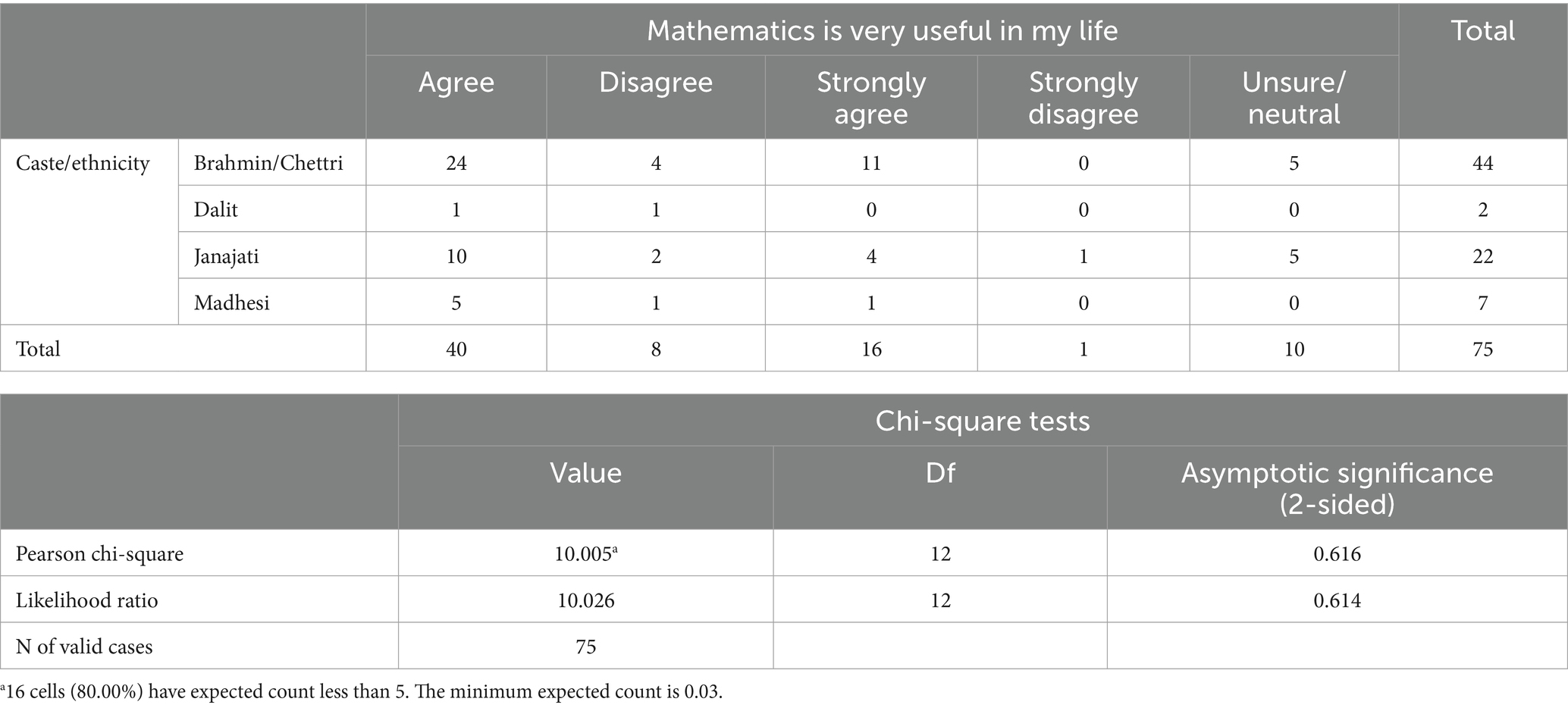
Table 7. Cross-tabulation of caste/ethnicity and mathematics is very useful in female students’ life.
6.3 “Caste/ethnicity” and “mathematics is a male-dominant subject”
H0: There is no association between “caste/ethnicity” and “mathematics is a male-dominant subject.”
The key result in the Chi-Square Tests in Table 8 is the Pearson Chi-Square. The value of the test statistic is 23.923. The corresponding p-value of the test statistic is p = 0.021. Since the p-value is smaller than the chosen significance level (α = 0.05), it rejects the null hypothesis and hints toward a likely association between caste/ethnicity and the perception that “mathematics is male dominant subject.” Based on the results, we cannot conclude that there is no association found between caste/ethnicity and the perception that “mathematics is a male-dominant subject” (χ2 = 23.923, p = 0.021).
6.4 Father’s occupation and “I learn mathematics to become a mathematics teacher in future”
H0: There is no association between father’s occupation and “I learn mathematics to become a mathematics teacher in the future.”
The key result in the Chi-Square Tests (Table 9) is the Pearson Chi-Square. The value of the test statistic is 12.206. The corresponding p-value of the test statistic is p = 0.590. Since the p-value is greater than the chosen significance level (α = 0.05), it does not reject the null hypothesis and concludes that there is not enough evidence to suggest an association between father’s occupation and “I learning mathematics to become a mathematics teacher in future.” Based on the results, it is concluded that no association was found between father’s occupation and “I learning mathematics to become a mathematics teacher in future” (χ2 = 12.206, p = 0.590).
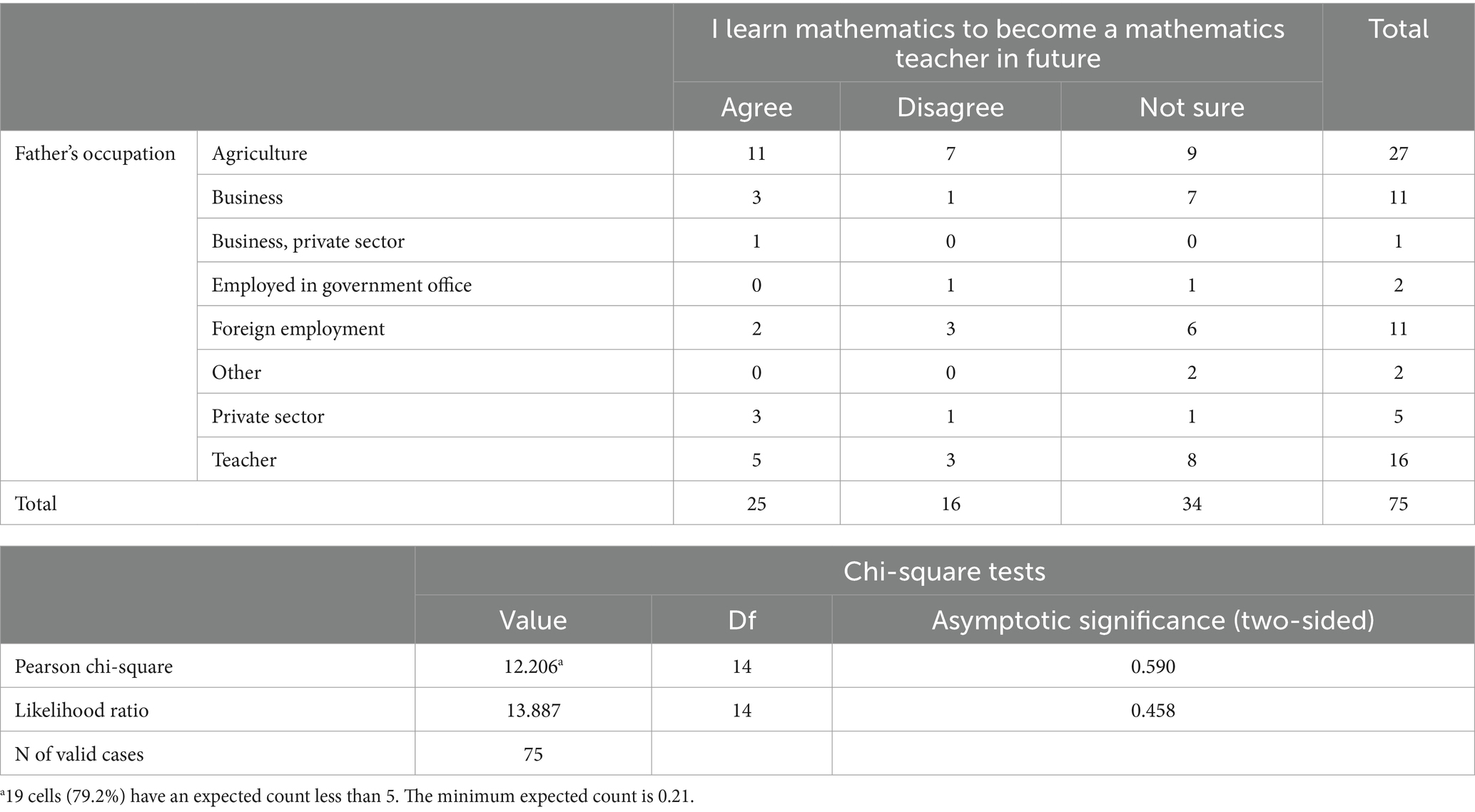
Table 9. Cross-tabulation of father’s occupation and “I learn mathematics to become a mathematics teacher in future”.
7 Conclusion of QUAN study
This study investigated female undergraduate mathematics students’ personal attributes, attitudes, self-efficacy, and motivation, as well as the associations between socio-demographic factors and their perceptions of mathematics. The key findings indicate that most participants were young (21 years old) and from Brahmin/Chettri ethnic backgrounds, with parents predominantly engaged in agriculture and possessing limited formal education, particularly among mothers. A significant 72% of students were negative toward mathematics, perceiving it as challenging, stressful, and male-dominated. Over half of the students (66%) reported experiencing anxiety in mathematics classes, and nearly half (49%) associated their gender with learning difficulties. Notably, 65% of students (strongly agreed) viewed mathematics as male-dominated, with caste/ethnicity significantly influencing this perception (χ2 = 23.923, p = 0.021). However, no association was found between caste/ethnicity and the perceived utility of mathematics (χ2 = 10.005, p = 0.616), as 74% acknowledged its usefulness despite their apprehensions. Self-efficacy among the students was low, with only 31% expressing confidence in acquiring mathematical skills and 52% doubting their ability to achieve top grades. Motivation was similarly tepid, with 49% uncertain about their commitment to mathematics and 36% opposed to pursuing it at the master’s level. Parental occupation, particularly that of fathers, showed no significant link to career aspirations in teaching (χ2 = 12.206, p = 0.590), highlighting weak extrinsic motivators. The findings underscore systemic barriers, including socio-cultural gender stereotypes and limited parental education, which may perpetuate negative attitudes and low confidence among female students. Educational interventions should focus on confidence-building pedagogies to address anxiety and self-efficacy gaps, gender-sensitive curricula to challenge male-dominated perceptions and foster inclusivity, career counseling to clarify the relevance of mathematics and diversify career pathways beyond teaching, and parental engagement to bridge educational disparities and broaden occupational aspirations. In conclusion, while female students recognize the value of mathematics, entrenched socio-cultural norms and inadequate support systems hinder their engagement. Addressing these challenges requires holistic reforms to transform perceptions, enhance confidence, and align mathematics education with students’ lived experiences and aspirations.
8 Gaps in the QUAN study and the need for QUAL research
The quantitative study provides valuable insights into female mathematics students’ demographics, attitudes, self-efficacy, and motivations. However, several critical gaps remain unaddressed, underscoring the necessity for a complementary qualitative study to deepen understanding of the socio-cultural, psychological, and institutional factors shaping these outcomes. Key gaps identified include a lack of contextual understanding. While 72% of students exhibited a negative attitude toward mathematics, the quantitative data do not explain why they perceive mathematics as stressful, male-dominated, or irrelevant to their goals. The association between caste/ethnicity and the perception of mathematics as “male-dominated” (χ2 = 23.923, p = 0.021) raises questions about how cultural norms, familial expectations, or systemic discrimination shape these views. The study also identifies low self-efficacy and motivation, with 37% of students showing negative self-efficacy and 49% expressing ambivalence about their commitment to mathematics. However, it does not explore the root causes, such as past educational experiences, teacher–student interactions, or societal stereotypes about gender and academic ability. Parental influence is another area of concern. Despite parents’ low educational attainment and agrarian occupations, the study does not investigate how parental attitudes, financial constraints, or gender roles at home influence students’ career aspirations or academic persistence. Additionally, Dalit (2.6%) and Madhesi (9.3%) students were underrepresented in the sample, limiting insights into how caste-based marginalization intersects with gender to shape access to resources, mentorship, or opportunities in mathematics. Methodological limitations include self-report bias, where responses may reflect social desirability or conformity to perceived norms rather than genuine attitudes, and the inability of the mixed-methods—QUAN and QUAL—research design to establish causality, such as whether negative attitudes lead to poor performance or vice versa. A qualitative approach is essential to address these gaps by exploring the lived experiences, cultural narratives, and institutional barriers that quantitative data cannot capture. Key areas of focus could include deepening the understanding of attitudes, exploring self-efficacy and motivation, examining the intersectionality of caste, gender, and class, unpacking parental and societal influences, and informing interventions.
In conclusion, the quantitative study highlights systemic issues, such as entrenched gender stereotypes, caste-based disparities, and low parental education, but leaves the human stories behind these statistics untold. A qualitative follow-up study would contextualize the numbers, amplify marginalized voices, and inform culturally responsive interventions to address the root causes of negative attitudes, low self-efficacy, and ambivalent motivation. By bridging the “what” with the “why,” mixed-methods research can drive meaningful change in mathematics education for female students in Nepal.
9 Findings and discussions of the QUAL study
To address the research question, we conducted interviews with four participants. We observed and analyzed the perception of female mathematics students. The major voices of participants obtained from the transcription of the interview are as follows:
Student 1: I feel mathematics is a challenging subject. I feel so happy to do mathematics, even if it is challenging. Sometimes, I get the highest mark but the lowest mark in mathematics. But I had to study it to find a career in it. Still, I am in a dilemma about whether the path I have chosen is correct or not. Sometimes, physical and biological causes hamper my practice of mathematics. I have faced a lot of inconveniences as a female during the journey of mathematics learning. I want to do a good job in the future. However, I am confused about whether I will get a good job in the field of mathematics in the future. So, I am still unsure if I will continue with mathematics after completing my bachelor’s degree.
Student 2: I do not think mathematics is a subject for females. Whenever I have mathematical problems, I feel weak and inferior. I must do all the household chores, and then after, I sit down to study and do mathematical problems, which is a big challenge because I am tired physically and mentally. I have always obtained below 50 marks in mathematics. It is very low marks in mathematics. This mark is not sufficient to get a good job in the future. My parents are farmers; they do not know what I am studying. They are telling me to get married rather than continue my studies. Furthermore, my relatives also complain about why I took Mathematics. Every month, relatives come to my house to talk about my marriage. Because of that, I cannot concentrate on my studies. My academic performance is also degrading. I have been facing many problems from my family and from my academic level. I do not think I will continue with mathematics after my Bachelor level.
Student 3: I perceive mathematics to be very hard, and indeed, it is really challenging. While doing mathematics, some topics are easy for me, and some are difficult. I am so happy when I solve mathematical problems, and they become correct, but sometimes, I regret it when the solved problem is incorrect, giving rise to fear. A kind of fear that says that I made a wrong decision and went to the mathematics field. I feel so weak that I cannot perform well in it. I got the lowest mark in every examination. I am confused about ways in which I can perform well in Mathematics. I do not know whether this study will help me or not to develop myself as a critical thinker. I am not sure if I will get a good job or not.
Student 4: Mathematics is hard and complicated, so most females tend to worry. This could be due to the kind of socialization and responsibility in our culture. My parents always say that boys and intelligent men should do mathematics but is not a suitable subject for females to study. I had to convince my parents to come here to study. I admit that mathematics is challenging, but I think that if we do hard work, we can succeed in mathematics. After completing my bachelor’s degree, I am trying to improve and continue with mathematics.
From the interview, we can observe that all the participants view mathematics as challenging, which most female students perceive as difficult. Different participants have different problems, dilemmas, and confusion about mathematics. Some feel an inferiority complex toward themselves and do not know the proper way to practice and develop a strong mathematical concept or foundation. After the transcription and analysis of interview data, we developed three themes that show the relation of perception with attitude, self-efficacy, and motivation. They were:
• Attitude of Students and Perception
• Self-Efficacy and Perception
• Motivation and Perception
9.1 Attitude of students and perception
After the interview with the female students, it was revealed that female students find mathematics a challenging, masculine subject. The findings are consistent with what Huff (2011) found: historically, mathematics is seen as male-dominated, and it has been a great challenge for female students to study mathematics. This discouragement of female students from studying mathematics seems to be culturally rooted in Nepali society. This may be likely to happen because female students may be negatively influenced by their sex-role stereotypes. They perceived it as terrible, and it is not certain to pass and further affect the career. They think and feel that they have less knowledge of mathematics. Even if they take the initiative to study mathematics, it is followed by a series of confusions and dilemmas. According to student 1, “Still, I am in a dilemma whether the path I have chosen is correct or not.” Here, in this case, according to Arnot (2007), feminism theories suggest that a girl-friendly environment has to be established so that all female students can enhance their academic growth.
Once the attitude is negative, we can interpret this to mean an insufficient zeal to study and practice solving mathematical-related problems. Furthermore, there is a higher possibility of developing external attributions such as teacher effect or inadequate resources toward their performance. Attitude can, therefore, be a major factor influencing perception and motivation that leads to a certain achievement, i.e., higher or lower. Here, according to the interview, we found the majority of female mathematics students have negative and a confused attitude due to low pass rate, insufficient zeal, a dilemma about their decision to take mathematics, and their fear for the future, which in turn have shown negative perceptions which is alongside to a low motivation and achievement rate.
9.2 Self-efficacy and perception
The student’s self-efficacy may be influenced by several things, including societal perception, education of fathers and mothers, and caste and ethnic background. This includes observational learning, motivation, reinforcement, self-control, and self-efficacy. In this relation, Bandura (1971) explains an individual’s behavior as influencing and being influenced by personal factors and the social environment. Self-efficacy is students’ belief about their capabilities to study mathematics at a designated level of performance. Most female students are not sure about their self-efficacy in mathematics performance. According to Bandura’s (1986, as cited in Ayotola and Adedeji, 2009) social cognitive theory, students’ judgments of their capability to perform academic tasks or self-efficacy beliefs help to predict their capability to accomplish such tasks. Researchers have demonstrated the value of self-efficacy beliefs in predicting students’ performances in mathematics. They are confused and questionable about their actual confidence. We can observe doubt in their self-confidence, which shows they are not confident. If they are not confident enough, they automatically lack positivity in their perception, as a confident person will have a positive perception.
9.3 Motivation and perception
In addition, the participants constantly mentioned the low pass rates in mathematics. Thus, low pass rates in mathematics caused female students to have low motivation toward the subject. Mensah et al. (2013) advocated that motivation can also be related to gender, as there are many who hold on to the view that boys do better in mathematics than girls. As a result, this belief tends to affect the motivation of girls toward mathematics, as society, people, and culture do not motivate them to study mathematics.
The participants’ voices elaborated on their unsure nature, which shows a sense of feeble nature in terms of motivation. If their motivations are not strong enough, they automatically lack positivity, as positive motivation results in positive perception. Bandura (1977) states that significant relations exist between self-efficacy, other motivation constructs, and academic achievements. Motivation, therefore, is one of the bases for the perception of female mathematics students.
10 Conclusion
The quantitative analysis revealed systemic challenges faced by female undergraduate mathematics students in Nepal. A significant majority (72%) exhibited negative attitudes toward mathematics, perceiving it as stressful, male-dominated (65% agree), and challenging. Low self-efficacy was evident, with only 31% confident in their mathematical abilities; motivation was tepid, and 49% were uncertain about pursuing mathematics at higher levels. Caste/ethnicity significantly influenced perceptions of mathematics as male-dominated (χ2 = 23.923, p = 0.021), though no link was found between caste and the perceived utility of mathematics. Parental occupation and education levels did not impact career aspirations, highlighting weak extrinsic motivators. Socio-demographic factors such as agrarian family backgrounds and limited maternal education underscored broader systemic inequities. While the quantitative data highlighted trends, it failed to capture the reasons behind these perceptions. Key gaps included a lack of contextual understanding, such as insights into cultural narratives, familial expectations, or classroom dynamics shaping attitudes. The underrepresentation of marginalized groups (such as Dalit and Madhesi) limited the exploration of how caste-gender intersections affect access to resources. The mixed-methods—QUAN and QUAL—design could not determine if negative attitudes caused poor performance or vice versa, and there was a risk of socially desirable responses obscuring genuine beliefs.
Interviews with four students contextualized the qualitative findings, revealing themes such as attitudes and perceptions of mathematics as inherently masculine and stressful, compounded by cultural stereotypes (e.g., “Mathematics is for boys”). Familial pressures to marry rather than pursue education exacerbated anxiety. Students doubted their capabilities due to inconsistent academic performance and lack of mentorship, with physical and mental fatigue from balancing household duties and studies further eroding confidence. Ambivalence stemmed from uncertain job prospects and societal discouragement, with scarce external validation (e.g., parental approval) weakening intrinsic motivation.
The study underlines how socio-cultural norms (e.g., gender roles, caste hierarchies) and institutional barriers (e.g., lack of gender-sensitive curricula) perpetuate negative perceptions. While students recognized the utility of mathematics, systemic inequities stifled engagement. A mixed-methods approach bridged the “what” and “why,” revealing the need for confidence-building interventions, such as pedagogies addressing anxiety through collaborative problem-solving; gender-sensitive reforms, such as curricula challenging stereotypes and showcasing female role models; community engagement programs educating families on the career relevance of mathematics and fostering support networks; and policy actions, such as scholarships for marginalized groups and teacher training in inclusive practices. This study fills a critical void in the literature on Nepali undergraduate females’ perceptions of mathematics, yet highlights lingering gaps. Future research should prioritize longitudinal designs to track causality, intersectional analyses of caste-gender dynamics, and participatory methods amplifying marginalized voices. By addressing these gaps, stakeholders can design targeted interventions to transform mathematics education into an equitable, empowering space for Nepali females.
11 Recommendations
The research study generated several findings and results. Based on these findings and the conclusions drawn, the following recommendations are made to policymakers: The government should create a supportive environment for girls, provide mathematics scholarships, conduct awareness programs about the importance of mathematics, and encourage female students to study the subject. Tribhuvan University can also actively work to increase the number and participation of female mathematics students pursuing careers in mathematics or mathematics education by providing special scholarships for higher studies in the field. Universities should develop a girl-friendly curriculum. Encouragement and motivation for female students should start at the family and societal levels, playing an equally important role in schools, colleges, and universities.
Regarding future research, this study was conducted in the Kathmandu Valley due to limited resources and time. Similar analyses can be conducted at the regional and national levels to provide a broader national perspective. This study focused only on motivation, attitude, and self-efficacy in mathematics. Further research can be conducted to establish a relationship between attitude, self-efficacy, and performance in mathematics among undergraduate female students.
12 Limitations of the study
The limitations of the study are multifaceted, impacting its scope, methodology, and contextual applicability. The small sample sizes, comprising 75 quantitative participants and four qualitative interviews, restrict the depth and generalizability of the findings. Accidentally, sampling for quantitative data introduces selection bias, as self-selected participants may skew results toward more motivated or accessible students. Additionally, the underrepresentation of marginalized groups, such as Dalit and Madhesi students, limits insights into the intersectional impacts of caste and gender. Geographically, the data collection was confined to campuses in the Kathmandu Valley, neglecting rural or regional contexts. This limitation means the findings may not accurately reflect Nepal’s diverse socio-cultural and educational landscapes. The cultural specificity of the study, including gender roles and caste dynamics, further restricts its applicability to other countries or regions with different norms. Methodologically, the study’s mixed-methods—QUAN and QUAL—design prevents the establishment of causality or tracking changes in perceptions over time. The reliance on self-reported data from surveys and interviews introduces potential biases, such as social desirability or recall inaccuracies. Theoretical limitations arise from the study’s reliance on feminist standpoint theory and Social Cognitive Theory, potentially overlooking alternative frameworks like critical race theory that could enrich the analysis of caste and gender intersections. Regarding data analysis, using chi-square tests with small, expected cell counts reduces reliability, and the lack of advanced statistical methods limits the exploration of multivariate relationships. The qualitative analysis also suffers from limited details on thematic analysis rigor, such as intercoder reliability and member checking, which may affect the credibility of the findings. Uncontrolled confounding variables, such as prior academic performance, teaching quality, and access to resources, were not accounted for, potentially confounding the results. Ethical considerations highlight that while confidentiality was maintained, the study does not address how power dynamics, such as researcher-participant hierarchies in a patriarchal society, might influence participant responses. The study’s narrow educational focus on undergraduate students excludes earlier educational stages, where perceptions of mathematics often form. Furthermore, while the study identifies systemic barriers, it offers limited actionable strategies for policymakers, such as teacher training or curriculum reforms. In conclusion, these limitations underline the scope, methodology, and context constraints that affect the study’s validity and applicability. Future research should address these gaps through longitudinal designs, larger and more representative samples, and mixed-methods frameworks that integrate intersectional and cross-cultural perspectives.
Data availability statement
The raw data supporting the conclusions of this article will be made available by the authors, without undue reservation.
Ethics statement
The studies involving humans were approved by the Ethics Committee of the Tribhuvan University, Nepal, has granted approval for this study. The studies were conducted in accordance with the local legislation and institutional requirements. The participants provided their written informed consent to participate in this study. Written informed consent was obtained from the individual(s) for the publication of any potentially identifiable images or data included in this article.
Author contributions
TP: Conceptualization, Data curation, Formal analysis, Investigation, Methodology, Project administration, Resources, Software, Supervision, Validation, Visualization, Writing – original draft, Writing – review & editing. ND: Conceptualization, Data curation, Formal analysis, Funding acquisition, Investigation, Methodology, Project administration, Resources, Software, Supervision, Validation, Visualization, Writing – original draft, Writing – review & editing. KH: Funding acquisition, Resources, Writing – original draft, Writing – review & editing.
Funding
The author(s) declare that financial support was received for the research and/or publication of this article. The publication support was received from the Institute for Advanced Research Publication Grant of United International University, Madani Avenue, 1212, Dhaka, Bangladesh. Ref. No.: IAR-2025-Pub-037.
Acknowledgments
We would like to express our gratitude to all the research participants for their valuable contributions.
Conflict of interest
The authors declare that the research was conducted in the absence of any commercial or financial relationships that could be construed as a potential conflict of interest.
Generative AI statement
The authors declare that no Gen AI was used in the creation of this manuscript.
Publisher’s note
All claims expressed in this article are solely those of the authors and do not necessarily represent those of their affiliated organizations, or those of the publisher, the editors and the reviewers. Any product that may be evaluated in this article, or claim that may be made by its manufacturer, is not guaranteed or endorsed by the publisher.
Supplementary material
The Supplementary material for this article can be found online at: https://www.frontiersin.org/articles/10.3389/feduc.2025.1555519/full#supplementary-material
References
Anderson, D. L. (2005). A portrait of a feminist mathematics classroom: what adolescent girls say about mathematics, themselves, and their experiences in a "unique" learning environment. Fem. Teach. 15, 175–194.
Arnot, M. (2007). “Education feminism, gender equality, and school reform in late twentieth century England” in International studies in educational inequality, theory and policy (Dordrecht: Springer), 538–557.
Ayotola, A., and Adedeji, T. (2009). The relationship between mathematics self-efficacy and achievement in mathematics. Proc. Soc. Behav. Sci. 1, 953–957. doi: 10.1016/j.sbspro.2009.01.169
Bajracharya, I. K. (2007). Determinants of achievement status of grade eight students in mathematics (Doctoral dissertation). Kritipur, Kathmandu, Nepal: Tribhuvan University.
Bandura, A. (1977). Self-efficacy: toward a unifying theory of behavioral change. Psychol. Rev. 84, 191–215. doi: 10.1037/0033-295X.84.2.191
Creswell, J. W. (2011). Educational research: Planning, conducting and evaluation qualitative and qualitative research. 4th Edn. Boston: Pearson.
Dahal, N., Neupane, B. P., Pant, B. P., Dhakal, R. K., Giri, D. R., Ghimire, P. R., et al. (2024). Participant selection procedures in qualitative research: experiences and some points for consideration. Front. Res. Met. Anal. 9:1512747. doi: 10.3389/frma.2024.1512747
ERO (2015). National Assessment of student achievement (NASA) 2013 (grade 8: Mathematics, Nepali and science). Sanothimi: ERO.
ERO (2018). National Assessment of student achievement (NASA) 2017 (grade 8: Mathematics, Nepali and science). Sanothimi: ERO.
European Commission, Facilitating Research Excellence in FP7 (2013). Ethics for research. Maidenhead: Open University Press.
Foley, C. (2016). Girls’ perceptions of mathematics: An interpretive study of girls’ mathematical identities. (Doctoral dissertation): University of Reading.
Giannoulas, A., and Stampoltzis, A. (2021). Attitudes and perceptions towards mathematics by Greek engineering students at university: an exploratory study. Int. Elect. J. Math. Educ. 16:em0639. doi: 10.29333/iejme/10906
Gogo, S., and Musonda, I. (2022). The use of the exploratory sequential approach in mixed-method research: a case of contextual top leadership interventions in Construction H&S. Int. J. Environ. Res. Public Health 19:7276. doi: 10.3390/ijerph19127276
Gudyanga, A., Mandizvidza, V., Gudyanga, E., and Gritter, K. (2016). Participation of rural Zimbabwean female students in mathematics: the influence of perception. Cogent Educ. 3:1156836. doi: 10.1080/2331186X.2016.1156836
Hansen, A. (2012). “Using children's mathematical misconceptions to support teaching and learning” in Improving primary mathematics teaching and learning. ed. M. McAteer (Maidenhead: Open University Press), 19–38.
Huff, K. D. (2011). Women in mathematics: an historical account of women's experiences and achievement (CMC senior theses, 150). Claremont McKenna College. Available online at: https://scholarship.claremont.edu/cmc_theses/150.
Kane, J. M., and Mertz, J. E. (2012). Debunking myths about gender and mathematics performance. Notices AMS 59, 10–21. doi: 10.1090/noti790
Khanal, B. (2018). Learning strategies of mathematics students (Doctoral dissertation). Kritipur, Kathmandu, Nepal: Tribhuvan University.
Leyva, L. A. (2017). Unpacking the male superiority myth and masculinization of mathematics at the intersections: a review of research on gender in mathematics education. J. Res. Math. Educ. 48, 397–433. doi: 10.5951/jresematheduc.48.4.0397
Luthans, F., and Youssef-Morgan, C. M. (2017). Psychological capital: an evidence-based positive approach. Annu. Rev. Organ. Psych. Organ. Behav. 4, 339–366. doi: 10.1146/annurev-orgpsych-032516-113324
Mazana, Y. M., Suero Montero, C., and Olifage, C. R. (2019). Investigating Students' attitude towards learning mathematics. Int. Elect. J. Math. Educ. 14, 207–231. doi: 10.29333/iejme/3997
Mensah, J. K., Okyere, M., and Kuranchie, A. (2013). Student attitude towards mathematics and performance: does the teacher attitude matter. J. Educ. Pract. 4, 132–139.
Mutodi, P., and Ngirande, H. (2014). The influence of students perceptions on mathematics performance. A case of a selected high School in South Africa. Mediterr. J. Soc. Sci. 5:431. doi: 10.5901/mjss.2014.v5n3p431
Norton, S. J., and Rennie, L. J. (1998). Students’ attitudes towards mathematics in single-sex and coeducational schools. Math. Educ. Res. J. 10, 16–36. doi: 10.1007/BF03217120
Pajares, F. (2005). “Gender differences in mathematics self- efficiency beliefs” in Gender differences in mathematics: An integrative psychological approach. eds. A. M. Gallagher and J. C. Kaufman (Boston: Cambridge University Press), 294–315.
Pangeni, K. P. (2014). Factors influencing quality of education: a case study of eighth grade students’ mathematics learning achievement in Nepal (doctoral dissertation): Nagoya University.
Paudel, T. (2018). Identity construction of female mathematics teachers: A narrative inquiry (Master of philosophy dissertation). Dhulikhel, Nepal: Kathmandu University.
Qiong, O. U. (2017). A brief introduction to perception. Stud. Literat. Lang. 15, 18–28. doi: 10.3968/10055
Raquel, S. (2024). Relationship between attitudes toward mathematics and perceptions of virtual teaching in the COVID-19 context. Front. Educ. 9:1414114. doi: 10.3389/feduc.2024.1414114
Shiyanbola, O. O., Rao, D., Bolt, D., Brown, C., Zhang, M., and Ward, E. (2021). Using an exploratory sequential mixed methods design to adapt an illness perception questionnaire for African Americans with diabetes: the mixed data integration process. Health Psychol. Behav. Med. 9, 796–817. doi: 10.1080/21642850.2021.1976650
Thapa, R. K. (2012). Women, their space and educational opportunity in Nepal (Doctoral dissertation). Dhulikhel, Nepal: Kathmandu University.
UGC (2012). Education management information system, Report on higher education 2010/11 (2067/68) Nepal. UGC: Bhaktapur.
Uwineza, I., Rubagiza, J., Hakizimana, T., and Uwamahoro, J. (2018). Gender attitudes and perceptions towards mathematics performance and enrolment in Rwandan secondary schools. Rwandan J. Educ. 4, 44–56.
Wambui, K. M. (2018). Factors influencing girls’ perceptions and attitudes towards mathematics in secondary schools of Westlands District, Nairobi County, Kenya (Doctoral dissertation). Kenya: Kenyatta University.
Keywords: mathematics perception, gender disparities, socio-cultural barriers, self-efficacy, mixed-methods, education, Nepal
Citation: Paudel T, Dahal N and Hasan MK (2025) Female undergraduates’ perception of mathematics: a mixed-methods study. Front. Educ. 10:1555519. doi: 10.3389/feduc.2025.1555519
Edited by:
Diego Gavilán Martín, University of Alicante, SpainReviewed by:
Na Li, Central China Normal University, ChinaOlajumoke Olayemi Salami, University of Johannesburg, South Africa
Copyright © 2025 Paudel, Dahal and Hasan. This is an open-access article distributed under the terms of the Creative Commons Attribution License (CC BY). The use, distribution or reproduction in other forums is permitted, provided the original author(s) and the copyright owner(s) are credited and that the original publication in this journal is cited, in accordance with accepted academic practice. No use, distribution or reproduction is permitted which does not comply with these terms.
*Correspondence: Niroj Dahal, bmlyb2pAa3Vzb2VkLmVkdS5ucA==
†ORCID: Tara Paudel, https://orcid.org/0000-0003-1122-3974
Niroj Dahal, https://orcid.org/0000-0001-7646-1186
Kamrul Hasan, https://orcid.org/0000-0003-2353-4673
 Tara Paudel1†
Tara Paudel1† Niroj Dahal
Niroj Dahal
